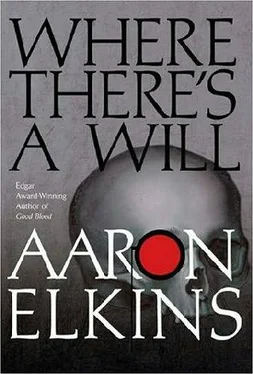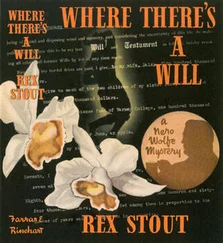Aaron Elkins - Where there's a will
Здесь есть возможность читать онлайн «Aaron Elkins - Where there's a will» весь текст электронной книги совершенно бесплатно (целиком полную версию без сокращений). В некоторых случаях можно слушать аудио, скачать через торрент в формате fb2 и присутствует краткое содержание. Жанр: Классический детектив, на английском языке. Описание произведения, (предисловие) а так же отзывы посетителей доступны на портале библиотеки ЛибКат.
- Название:Where there's a will
- Автор:
- Жанр:
- Год:неизвестен
- ISBN:нет данных
- Рейтинг книги:4 / 5. Голосов: 1
-
Избранное:Добавить в избранное
- Отзывы:
-
Ваша оценка:
- 80
- 1
- 2
- 3
- 4
- 5
Where there's a will: краткое содержание, описание и аннотация
Предлагаем к чтению аннотацию, описание, краткое содержание или предисловие (зависит от того, что написал сам автор книги «Where there's a will»). Если вы не нашли необходимую информацию о книге — напишите в комментариях, мы постараемся отыскать её.
Where there's a will — читать онлайн бесплатно полную книгу (весь текст) целиком
Ниже представлен текст книги, разбитый по страницам. Система сохранения места последней прочитанной страницы, позволяет с удобством читать онлайн бесплатно книгу «Where there's a will», без необходимости каждый раз заново искать на чём Вы остановились. Поставьте закладку, и сможете в любой момент перейти на страницу, на которой закончили чтение.
Интервал:
Закладка:
“Hey, don’t go all defensive on me, Doc. I’m just asking a question.”
“Who’s getting defensive?” Gideon said.
But of course he was. He’d just completed what seemed to him a neat bit of reasoning, and he could have used a little amazement, or at least approbation, and not a string of skeptical questions. “Come on, John, you’re a cop. How often do you get every single piece of evidence you’d like to have? You play the hand you’re dealt, and this particular hand plays out to one conclusion: Magnus Torkelsson.”
It wasn’t just the foot, he pointed out. Everything added up, and there was nothing to lead off in any other direction. An airplane from the Hoaloha Ranch, lost since the very night Magnus flew off in it and disappeared; a woman that nicely fit the description of his pilot;-he ticked the items off on his fingers-and a male of advanced age who, as it happened, had spent a lot of time in the saddle. How many other people-missing people-would that combination fit?
John held up his hands. “Hey, if you say it’s him, that’s good enough for me. Magnus it is. What do I know?”
A smile twitched at the corners of his mouth, and then the skin around his eyes crinkled up, and then they both were laughing.
“I’m sorry I got defensive there, John.”
“No problem, Doc.”
There was only one thing that nagged at him a little, he admitted, and that was the fact that he’d known too much about the case to start with. Forensic anthropology was like anything else: You tended to find what you were looking for. It wasn’t supposed to work that way. When he consulted for the police or the FBI, he made a point, when possible, of not knowing anything about the suspected identity of the remains he was to examine: not the sex, not the age, not the race, nothing. But here he’d been aware of how old Magnus was, of his sex, of the fact that he rode a horse, of the age and sex of the pilot, even of her bulimia. And what do you know, his analysis of a very few bones had confirmed every single expectation. That was slightly worrisome: Had he over-reached for what he’d believed, a priori, to be the facts?
“Nah,” said John airily. “You’re never wrong about that kind of thing. Well, not that often.”
“I appreciate the vote of confidence, if that’s what that was. Anyway, I have an ace up my sleeve. When I was checking the bones for fractures, I saw that a couple of toe bones were missing after all, and when I took a closer… well, take a look at the middle phalanges of the second and third toes.”
“The, uh, middle…?”
“These two,” Gideon said. “The distal phalanges-the outermost parts, the segments that had the toenails-are the missing ones, and these two are the ones that adjoined them.”
“They are?” John said, bending closer. “They don’t look like the others, do they? They’re barely half as long. And they’re thinner, and they, like, come to a point, almost…”
“The toes have been amputated, John. The distal phalanges and a segment of the middle phalanges have been removed. And when that happens the bone that’s left-the proximal portion of the middle phalanges, in this case-is likely to develop osteoporotic atrophy over time and become resorbed-absorbed back into itself-starting at the end where the amputation occurred. That’s why they look that way.”
“So this happened a long time ago?”
“Oh, yes. Years and years. Decades, probably.”
“And when you say ‘amputation,’ you mean by a doctor? An operation? Not some kind of accident?”
“No way to tell, not anymore. There’s been too much remodeling. The site of the original separation is long gone.”
John was looking a little confused. “So… why is this an ace up your sleeve? What does it tell you?”
“It doesn’t tell me anything, but it ought to tell the Torkelssons something. It’s a ‘factor of individuation,’ as we so grandly call it. If it turns out that Magnus Torkelsson had two toes missing-which it will, I think-that’ll settle it for good. Case closed, all doubts resolved.”
Harvey had brought the materials he asked for, and Gideon began wrapping the individual bones loosely in newspaper. “You wouldn’t happen to know, would you, John?”
“If he was missing any toes?” He shook his head. “I wouldn’t know. He didn’t have a limp; nothing I noticed, anyway.”
“Well, we’ll be seeing Felix tonight in Waikiki,” Gideon said, fitting the cover on the carton with the satisfying sense of having accomplished what he’d come for. “He’ll know.”
SEVEN
“Whoo,” said John, having completed his first long swallow of the frosted Mai Tai that had been placed before him. “I’m in heaven.”
So was Gideon. After the stagnant heat of Maravovo Atoll, the ocean breezes of Waikiki Beach, perfumed with gardenia and frangipani, flowed over them like balm. They had arrived at the Honolulu airport two hours earlier and had taken a taxi to the Royal Hawaiian Hotel-the posh, venerable “Pink Palace”-where the desk clerk had apologized for not having two ocean-view rooms available, but Gideon, if not John, was happy to be looking out over the green canopy of the giant banyan tree and the quiet, shaded gardens, rather than the jammed beach with its pungent smells of sunscreen and its multitudes of bare, glistening, not-so-beautiful bodies slow-cooking on their roll-up straw mats.
There had been a message from Felix waiting for them: He had been delayed at a meeting on Kauai and would not be back until five. And he had to be on a red-eye flight to San Francisco later in the evening, but with any luck he would meet them for a drink at six-thirty at the House Without a Key, the open-air restaurant-bar at the Halekulani Hotel. They had showered and changed, then walked the two blocks down Kalakaua Avenue from the Royal Hawaiian to the Halekulani, both of them slightly dazed by an enjoyable sense of disjunction, of disconnect. Only a little while ago they had been on a tiny speck of land in the Pacific, one of the most remote and isolated places in the world, with nothing but black flies and land crabs for company (but plenty of those). Now, later that same day, here they were on one of the most cosmopolitan boulevards to be found anywhere, fording streams of avid shoppers, tourists, and locals, seemingly of every race and sub-race on the planet. There were flip-flop-shod surfers toting boards on their heads or under their arms, perspiring, grim-faced joggers, dignified Japanese elders walking with their hands behind their backs and taking in the sights, tight clumps of nervous-looking Eastern Europeans, prim Asian ladies handing out brochures for shows and bus tours, and piratical, dissipated men with parrots and macaws on their shoulders (“What do you say, Jack, take a picture with one for ten bucks, with all four for twenty bucks?”).
The terrace at the House Without a Key, by contrast, was an oasis of taste and tranquility. When they arrived, the evening’s Hawaiian music was just getting underway. They had listened contentedly to the soft, agreeable melodies and the surf for a while, then ordered drinks-John’s Mai Tai and a Fire Rock Pale Ale from Kona for Gideon.
“Pretty romantic place,” Gideon said, taking in the scene. The musicians-a guitarist, a slack-key guitarist, a Hawaiian falsetto singer with an achingly sweet voice-and a smiling hula dancer performed on a low bandstand beneath an ancient kiawe tree, with the purple sea and the setting sun at their backs. The drinkers and diners sat at tables under a tropical sky of deepening blue-green tinged with rose. Off to the left, the unmistakable profile of Diamond Head loomed, slowly losing its folds and hollowed contours to shadow.
“It sure is,” John replied. “So what am I doing here with you?”
Читать дальшеИнтервал:
Закладка:
Похожие книги на «Where there's a will»
Представляем Вашему вниманию похожие книги на «Where there's a will» списком для выбора. Мы отобрали схожую по названию и смыслу литературу в надежде предоставить читателям больше вариантов отыскать новые, интересные, ещё непрочитанные произведения.
Обсуждение, отзывы о книге «Where there's a will» и просто собственные мнения читателей. Оставьте ваши комментарии, напишите, что Вы думаете о произведении, его смысле или главных героях. Укажите что конкретно понравилось, а что нет, и почему Вы так считаете.












